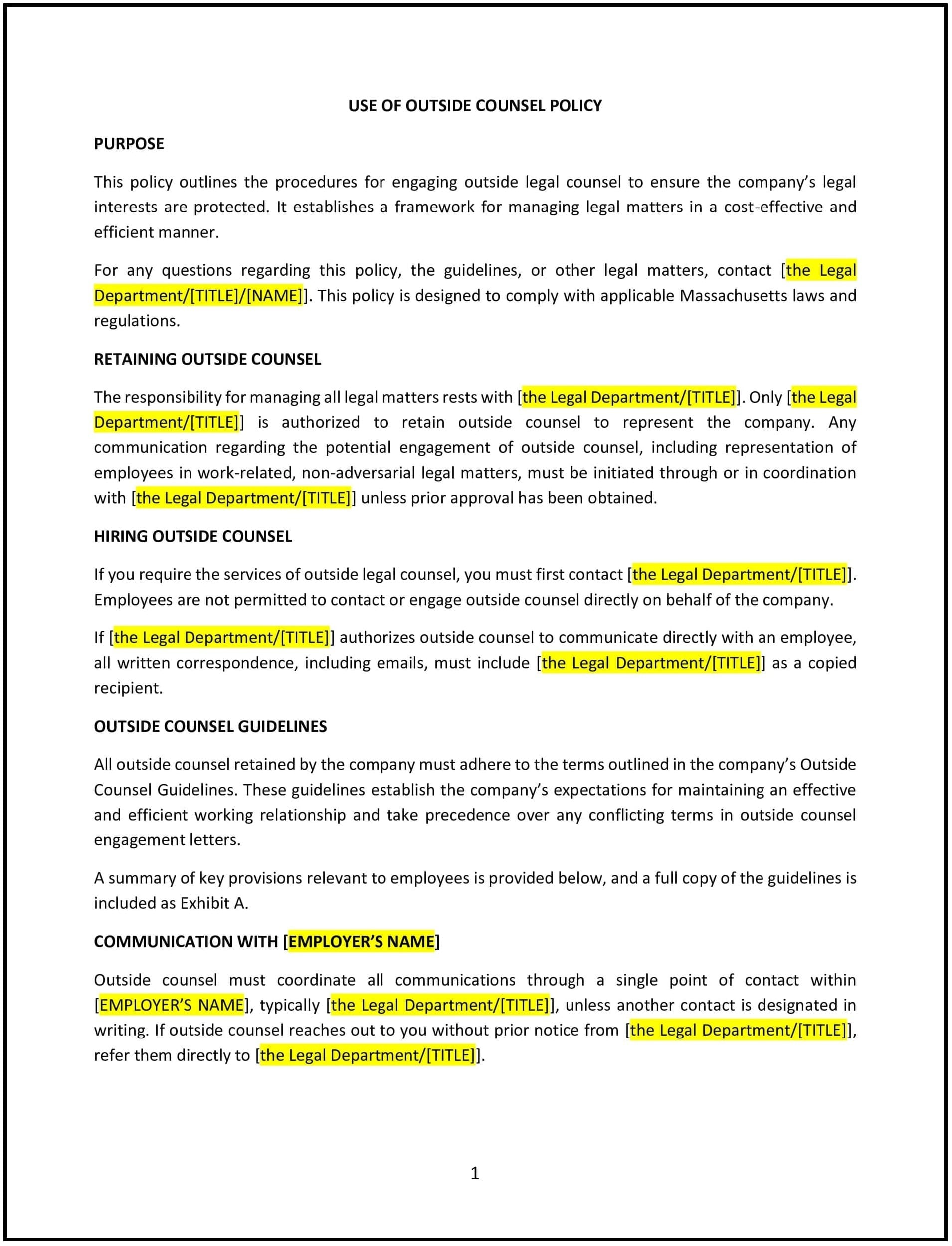Use of outside counsel policy (Massachusetts): Free template
Got contracts to review? While you're here for policies, let Cobrief make contract review effortless—start your free review now.

Customize this template for free
This use of outside counsel policy is designed to help Massachusetts businesses manage the engagement of external legal counsel, ensuring that outside lawyers or law firms are used appropriately, effectively, and in compliance with company policies and applicable laws. The policy outlines the process for selecting, retaining, and managing outside counsel, as well as guidelines for maintaining consistency and controlling legal costs while ensuring high-quality legal representation.
By adopting this policy, businesses can establish clear expectations for the use of outside counsel, protect the company’s legal interests, and manage external legal services efficiently and cost-effectively.
How to use this use of outside counsel policy (Massachusetts)
- Define when outside counsel is required: Clearly outline situations where outside counsel should be engaged. This may include complex legal matters, litigation, regulatory compliance, intellectual property protection, or when in-house legal staff lacks the expertise required.
- Establish the approval process: Specify the process for approving the use of outside counsel. This may involve obtaining approval from senior management or the legal department before engaging any outside lawyers or law firms.
- Provide guidelines for selecting outside counsel: Establish criteria for selecting outside counsel, including experience, expertise, reputation, and cost-effectiveness. The policy should encourage selecting counsel that is aligned with the company’s legal needs and values.
- Define the scope of work: Outline the scope of work to be performed by outside counsel, including specific tasks, objectives, and timelines. The policy should also specify that outside counsel must act in accordance with the company’s best interests and in alignment with its objectives.
- Address fees and billing: Set clear guidelines regarding the billing process, including hourly rates, flat fees, retainer agreements, and the payment schedule. The policy should establish a process for monitoring legal expenses to ensure that they remain within budget and are justified by the work performed.
- Ensure compliance with Massachusetts and federal laws: Ensure that the policy complies with Massachusetts state laws and federal regulations, including requirements related to confidentiality, privilege, and conflicts of interest when working with outside counsel.
- Review and update regularly: Periodically review and update the policy to ensure it is compliant with Massachusetts state laws, federal regulations, and changes in the company’s legal and operational needs.
Benefits of using this use of outside counsel policy (Massachusetts)
This policy offers several benefits for Massachusetts businesses:
- Ensures effective legal representation: The policy helps businesses select and retain outside counsel with the right expertise and experience, ensuring that legal matters are handled effectively and efficiently.
- Controls legal costs: By setting guidelines for billing and monitoring expenses, the policy helps businesses manage legal costs and avoid unnecessary or excessive fees associated with outside counsel.
- Promotes consistency: The policy provides clear guidelines for engaging outside counsel, ensuring that external legal representation aligns with the company’s goals and operations, and that it is consistent with internal legal strategies.
- Protects legal interests: The policy helps businesses protect their legal interests by ensuring that outside counsel is retained for the right reasons and is aligned with the company’s objectives, reducing the risk of legal conflicts or misunderstandings.
- Strengthens legal compliance: By ensuring that the engagement of outside counsel complies with Massachusetts state laws and federal regulations, businesses can reduce the risk of legal issues related to conflicts of interest, confidentiality breaches, or non-compliance.
- Enhances relationships with outside counsel: By setting clear expectations and processes for working with outside counsel, the policy helps build positive, long-term relationships between the company and external legal providers.
Tips for using this use of outside counsel policy (Massachusetts)
- Communicate the policy clearly: Ensure that all employees, particularly those in legal, procurement, or management roles, are aware of the policy and understand how to request or engage outside counsel. Include the policy in the employee handbook and review it during onboarding or relevant team meetings.
- Establish a review and approval process: Put in place a clear and efficient approval process for engaging outside counsel. This should include obtaining approvals from relevant departments and ensuring that the legal department is consulted before finalizing any agreements.
- Track legal expenses: Use software or tools to track and monitor legal expenses associated with outside counsel to ensure compliance with budget constraints. This will also help in evaluating the cost-effectiveness of the engagement.
- Ensure clear communication with outside counsel: Maintain open lines of communication with outside counsel to ensure that legal strategies, timelines, and deliverables are aligned with the company’s expectations. Provide guidance as necessary to ensure that the company’s objectives are met.
- Review engagement terms regularly: Periodically review the terms of engagement with outside counsel, including fees and scope of work, to ensure that they continue to meet the company’s needs. This may involve renegotiating terms or considering alternative providers if necessary.
- Review and update regularly: Periodically review the policy to ensure it is compliant with Massachusetts state laws, federal regulations, and any changes in the company’s approach to engaging external legal services.